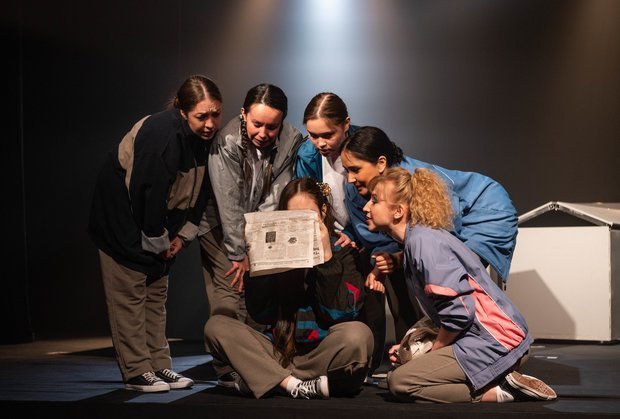‘I will definitely come back’: how a director from China stages a play in Tatar, barely having learned Russian
The repertoire of the Atninsky Theatre will include a performance by a Chinese director

Yichen Liu, a graduate of the Russian Institute of Theatre Arts (GITIS), has become the first young director who staged a diploma performance on the stage of the Tatar theatre as part of the cooperation programme between the main theatre university of Russia and the Tatarstan theatre. As a result, the premiere of the play “Natasha's Dream” based on the play by Yaroslav Pulinovich took place on the stage of the Atninsky Tatar State Drama Theatre named after Gabdulla Tukay. How the Chinese woman learned Russian and staged a performance in Tatar — she told the correspondent of Realnoe Vremya.
“I love Chekhov and Nabokov most of all”
Yichen Liu, a graduate of the Russian Institute of Theatrical Art, hails from the Chinese city of Weifang. The young woman has always been interested in Russian literature. She graduated from the philological department of a university in her country, but decided to enroll in a master's degree at the Russian university. At the same time, Yichen was fond of theatre, she played in a small school, and then in a student troupe, but she never thought that her life would be connected with this sphere.
Upon arrival in Russia, one of the Chinese woman's favourite activities was visiting the capital's theatres, and there was a desire to develop in this direction.
“First, I entered a theatre university in St. Petersburg in 2016, then I transferred to Moscow. I think I was very lucky," the young woman admits.

No one in the Yichen family was connected with Russia, she was the first one who wanted to move and study in our country. She learned Russian almost from scratch. The young woman came to Russia when she was 21 years old.
“I love Chekhov and Nabokov most of all. I read Russian literature while still in China, especially Tolstoy and Dostoevsky in Chinese. When I started living in Russia, I began to reread all these works in Russian. These are two different things. I read a lot, but even now I don't fully understand some of the nuances. I reread some episodes several times and still often work with a dictionary," the Chinese woman said.
“The task was to stage a Russian play in the Tatar language”
The offer to go to Tatarstan came to her quite unexpectedly.
“For my thesis, I was looking for an opportunity to stage my own performance, I needed a platform. Under a special programme, I was offered to go to Tatarstan. And I agreed. The task was to stage a Russian play in the Tatar language. It was a very interesting challenge for me. Different languages, different cultures. Besides, we have chosen not the simplest material. Especially for a small theatre that works in a village where the mentality is completely different," Yichen said.
According to the young director, the work shows the problems of modern society and, at the same time, many touching moments.
“This is very important to me. The main thing in this play is a dream and love. Everyone has the right to love and dream. These are universal values that everyone understands, regardless of nationality.”

“Natasha's Dream” is a play by playwright from Yekaterinburg Yaroslav Pulinovich. This is a play about growing up, about first love, about the complexity of becoming and understanding yourself and the world, about building relationships with others. Natasha Banina, a pupil of the orphanage, jumps out of the window on a bet, having managed to make a cherished wish. Miraculously surviving, she begins to believe that the dream is about to come true, and now, for the sake of realising this very dream, Natasha is ready to go to great lengths. To almost everything.
“I've never heard Tatar before”
The main feature of the work in the Tatar village for the Chinese woman was an unfamiliar language for her — the play was staged in Tatar.

“I've never heard Tatar before. Moreover, I didn't understand anything in Tatar. It was saved by that everyone around knew Russian and communication was easy. Ignorance of the Tatar language, on the one hand, was a problem, but, on the other hand, it allowed not to be distracted by the text, but to redirect all attention to the action.”
The main role in the play was played by Liana Kayumova. It was a surprise that the choice of the Chinese director fell on her, the young woman admitted.

The Atninsky Tatar State Drama Theatre named after Gabdulla Tukai came up with the initiative of the joint project with GITIS, in which a director from China took part. The leadership of the Russian Institute of Theatrical Art supported this idea. The project is funded by the Presidential Fund for Cultural Initiatives and the Prokhorov Foundation. The director of the theatre, Lenar Zaynullin, told the publication about this.
“During one of the strategic sessions, the idea arose to provide a platform for young directors, graduates of Kazan universities. But we decided to go further and not limit ourselves to Kazan, but to go to GITIS. Oleg Laevsky, a well-known theatre critic, helped us bring this project to life, and he also really liked the idea of such cooperation. We submitted an official letter with our proposal to the leadership of GITIS. As it turned out, at the very right time. The thing is that earlier graduates of the directing departent used to stage diploma performances on their own, but now the requirements have changed — performances must be staged on professional theatre stages, and here graduates have a problem of lack of venues," said the head of the theatre.
“Our goal is to make the theatre attractive for this generation”
As a result, a whole group came to the Atninsky Theatre, which also turned out to be international: it included a director — a native of China, Yichen Liu, an artist Martin Stepanov — from Donbass, a choreographer — Elizaveta Matviyevich from Belarus. In April, the premiere of the play “Natasha's Dream” took place on the stage of the small hall, which was prepared in just 20 days. However, it was shown only once.

“Now there is a change of generations of viewers in the theatre. School students do not particularly go to theatres on their own personal desire, they are brought, one might say, by force — using the Pushkin Card. Our goal is to make the theatre attractive for this generation. To show performances on stage where their language is spoken," Lenar Zaynullin told about the goals of the project.

The main difficulty was the peculiarities of translating the play into the Tatar language. In the original, a lot of obscenities and slang was used. The text was translated into Tatar by the poet and deputy director of the Atninsky Theatre for marketing, Gelusa Battalova:
“There was one 'but'. The text in the Tatar language turned out to be too 'smoothed', fully corresponding to our Tatar mentality. There is not a single obscene expression left in the text, unlike the original text, where there are a lot of them. We realised that if we leave such translation, then a completely different performance will turn out on stage, the character of the play will completely change. The actors even began to offer to stage the play entirely in Russian. But we categorically rejected this idea. I am sure it is wrong to do this on the stage of a Tatar theatre. Therefore, we decided to take another risky step — we left obscene words without translation, they sound in Russian. At the premiere, we received a portion of criticism for this.”

The joint project is planned to be made long-term — every year one graduation performance of a student of GITIS will be realised on the stage of the theatre.
“I was shocked by the difference”
Yichen Liu plans to return to Tatarstan again:
“I will be happy if they call me to work here again. Tatarstan has remained a very pleasant and cultural place in my memory. I want to know even more about it now. Everything was new to me here. Especially since I used to live only in Moscow and St. Petersburg. At first, I was really shocked by that everything here is so different — the species, the culture, and the language.”
The Chinese woman had the opportunity to visit Kazan. On the last day of her stay in Tatarstan, after the premiere, she had a single free day, then it was organised a tour around the centre of Kazan for her.
“To be honest, I did not understand a lot of what the guide told me, because there were a lot of unfamiliar historical terms, and it was not very convenient to ask each time what it meant. But all the same, it was all very beautiful and interesting for me. If the opportunity arises, I will definitely return to Tatarstan," Yichen assured.